|
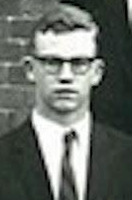
Colin Mason was with our cohort for only one year, and so was not widely known among us. He arrived in 1961 from Rhodesia and joined us in 6th form. Colin's quiet, unobtrusive nature attracted little attention, but those who did get to know him discovered a boy of almost naive kindness and good will to others. It came as no surprise to us that he became a Catholic priest, and devoted his entire career to service at the local level where he was in contant touch with parishoners and their needs.
After leaving DHS and working for a while in banking, Colin entered St Joseph's Theological Seminary in Cedara in 1963. He stayed there for seven years and was eventually ordained for the priesthood in 1970. The photo below was taken while he was a seminary student:
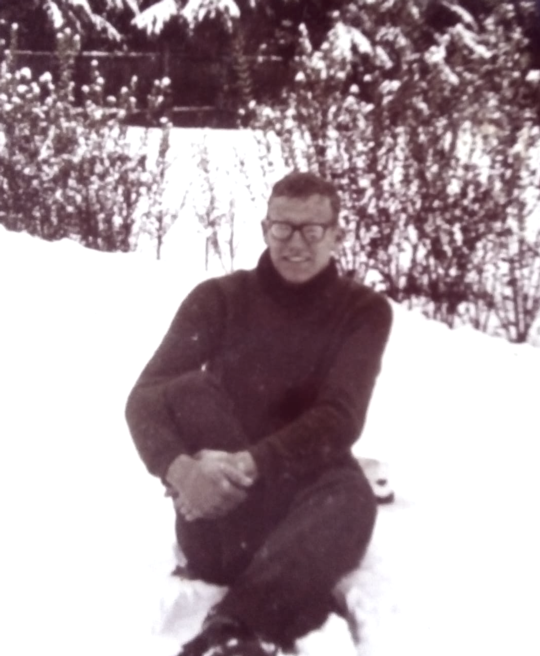
Colin then served in the Church for short periods in Rhodesia and South Africa before he was transferred to Australia. He spent the rest of his professional life there, in the pleasant suburbs of Sydney. Here is a photo of him in mid-career:
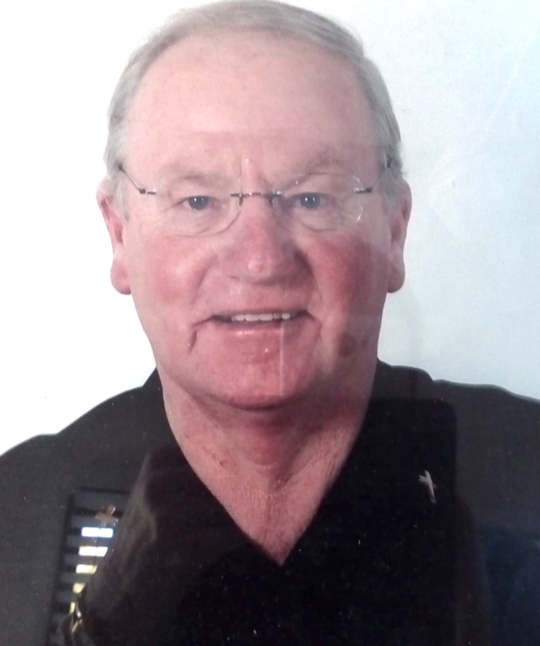
By all accounts Colin rarely strayed beyond his parish and his duties there, but here he is on a visit to New Zealand:
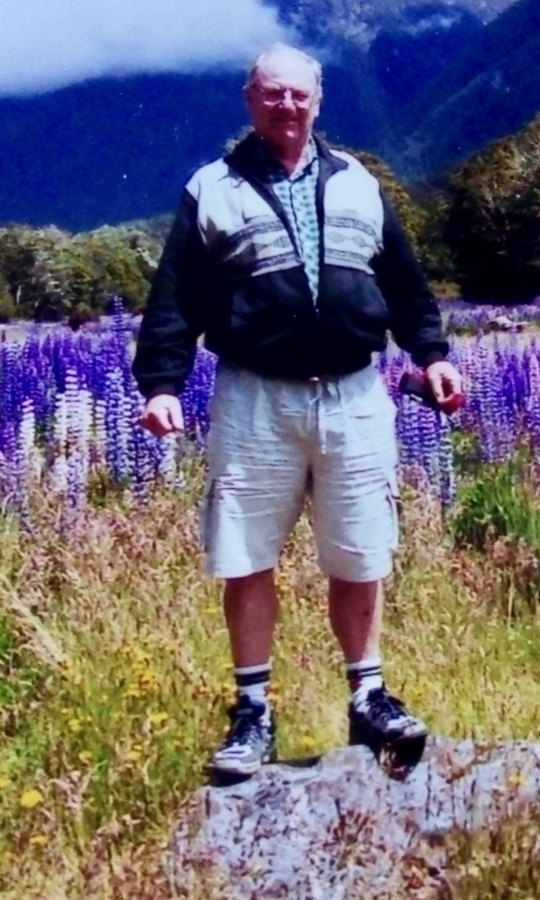
...And here he with is brother John (also ex DHS) at the Sydney Olympics in 2000:
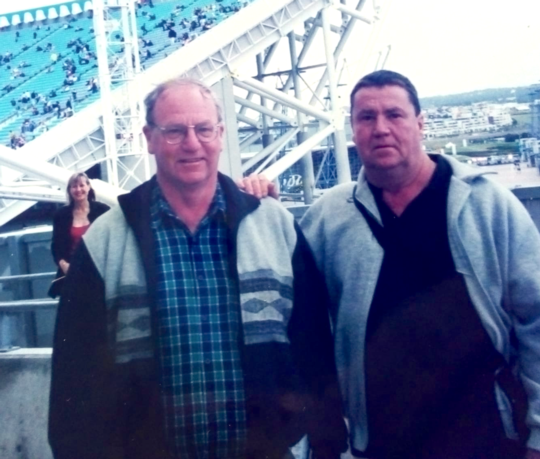
Colin had no ambitions to rise in the church hierarchy: not for him the bishop's mitre or cardinal's hat. Colin he was always entirely content with his role as parish priest. He spent the final part of his career, from 1976 onwards, as parish priest of Our Lady of Lourdes Church in the greater Sydney area. The original church was inadequate and delapidated, and Colin set about raising funds and organizing resources to build a new church, an ambition that was completed in 1982.
After his retirement Colin lived in a church facility for retired priests near Brisbane. However in recent years he suffered a heart attack and a series of strokes, which seriously affected his health. He did emerge briefly from retirement to perform one last sacrament, the baptism of his brother's grandchild:
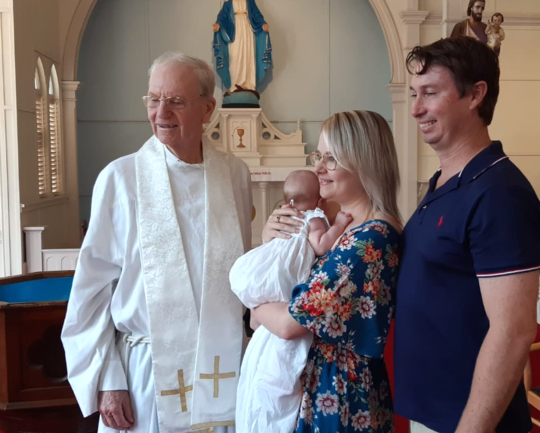
Unfortunately a further stroke seriously hindered his speech and movement. None the less, he was able to communicate by phone with former schoolmates, and retained vivid recall of his time at DHS.
In 2020 Colin was moved to a Catholic nursing home in Townsville on the north east coast of Australia, where his brother's family resides. His health went into rapid decline and he passed away from cerebrovascular disease on 13 July, 2021.
Our classmate Colin Mason was privileged to have exactly the existence he wanted: a life of service to others and to his God.
[For their help with this obituary note, special thanks to Colin's brother John and sister-in-law Heather, and to Antony Buliimore who kept in touch with Colin in his final years.]
|

![]()







Adrian Tronson
REMEMBERING COLIN MASON
Colin turned up in form 6L in 1961, sometime after the beginning of the term. I was delegated with the task of showing him around the school, 'the ropes,' so to say. He was a pleasant fellow, polite, quiet, easy to talk to and interested in his surroundings. We used to travel to school together on the 7.05 bus which plied the route between the Marine Parade and Vause Road. I boarded the bus at the terminus near the Natal Command and he boarded somewhere near West Street and often we ended up sitting together. We spoke about this and that but, as far as I remember, little about our backgrounds. He was reserved, like me, and we respected each other's privacy. I was surprised, however, when one winter's day, when I was alone in our flat and recovering from a long and debilitating bout of whooping cough and pneumonia, which cost me four weeks of classes in June, he turned up at our flat on the 11th floor to find out what had happened to me and how I was. I had never told him our address and I was tremendously touched by his concern, the fact that he had been aware of my prolonged absence and that he had gone to the trouble to find out my address. We had tea and spoke among other things, about our plans for the following year. I cannot remember whether he told me about his career plans but it is quite possible that he mentioned his interest in the Church.
Such decency, consideration for others, and sincerity—some would take as naïvety– often arouses a sadistic inclination in adolescent boys to tempt their victim into behaving like themselves (I can speak from experience), or to 'lose control' in some way. Colin seemed to be an ideal victim for such an experiment, and in the lewdness of their minds, a certain element in our class devised some lekker pranks. I cannot remember in which order the following two incidents occurred but one followed soon after the other. I can't clearly remember the names of the perpetrators of the following trick but there were two individuals involved, who, in the brief interval between classes crept under and between the desks and from behind secured Colin's legs to his chair. They then silently retreated to their allotted seats in the manner in which they had approached. Conveniently, Colin seemed to be deeply engrossed in some exercise or other and apparently didn't notice what was going on under his desk. Most of the class was sobbing with barely repressible laughter. The master entered (most likely Pope or Jiggs). All stood except Colin.
"Mason, it is customary for the class to stand when a master enters," the master said sternly.Colin, seated, calmly and matter-of-factly responded with something like the following: ' I can't stand, sir, since I'm tied to the desk.' The class exploded into a howl of mirth and the master called on those responsible to release the boy and report to him after class. I don't recall what happened after that.
The second prank was even more devious and wicked. The architect of this iniquity was Robertson who has given me permission to divulge his villainous machinations as I recall them. The events unfolded as follows: During a history class, Pope asked 'the new boy' how much of Durban's local history he knew. Colin replied that he didn't know much about it. Pope set him an assignment for the weekend on the equestrian statue of Dick King, situated on what was then called the Esplanade. In1842 King rode from Durban to Grahamstown in 10 days to get reinforcements for the British, besieged by the Boers) and told him to report on what the statue commemorated when the class met the following week. Robertson immediately offered his expertise and kindly filled Colin in on some of the details. I don't know exactly what he told him but on the Monday Colin recited his findings to Pope and to the class: namely, that, among other 'facts' that I cannot remember, he said that the statue was of a local hero called Herb Flerbs who did Many Great Things. I can't remember the details of his presentation except that the hero had been buried under the main Post Office. The class burst into peals of laughter. Pope, smiling knowingly, looked at Robertson and said: "This is your work, isn't it, Robertson?" To which Ian, blushing slightly, muttered something or other. Colin, with infinite good humour and long-suffering patience calmly sat down again, like Walt Whitman's old sea-captain in Leaves of Grass: '[one] ... of the few, very choice, taciturn, whom fate can never surprise nor death dismay.'